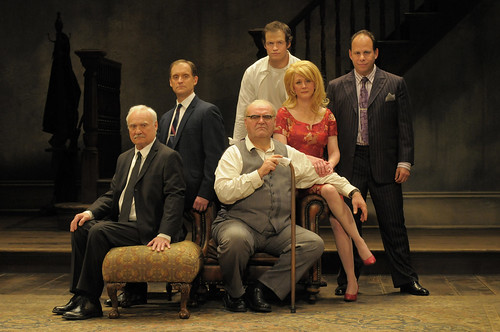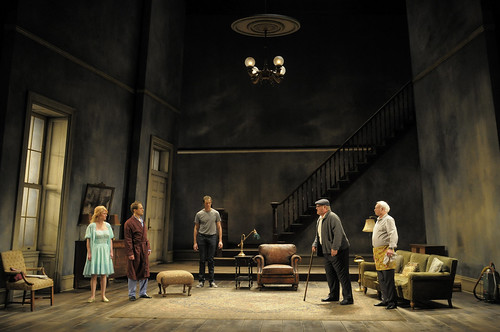Nostalgic for The Homecoming at a different home
The cast of ACT's The Homecoming includes (from left) Kenneth Welsh, Anthony Fusco, Jack Willis (seated), Adam O'Byrne, René Augesen and Andrew Polk. Below: The cast in the shadows of Daniel Ostling's impressive set. Photos by Kevin Berne
The absolute power of live theater, when it's done superbly well, is undeniable. The connection the playwright, the director, the actors and designers forge with the audience – and vice-versa – can be incredibly powerful.
That's a wonderful thing and leave a lasting impression. Sometimes, perhaps, too lasting.
Last week I saw Carey Perloff's production of Harold Pinter's The Homecoming for American Conservatory Theater. It's a bizarre, tormentingly fascinating play by a master playwright at the height of his game-playing dramatic powers. And though the production is fine, all I could think about was the Aurora Theatre Company production staged by Tom Ross at the Berkeley City Club in April of 2000.
I've seen a lot of plays in the nearly 11 years between that production and this one, and yet while sitting in the giant ACT space, I was longing for the intimacy (where horror is even more horrific when you feel like it's unfolding in your lap and there's no escape). I could even remember line readings delivered by Julian Lopez-Morillas as Max, the monstrous father figure, now played by ACT company member Jack Willis, and by James Carpenter and Rebecca Dines, who play Max's returning son, Teddy, and his wife, Ruth. René Augesen, celebrating her 10th anniversary as an ACT company member, did the most of any cast member in the current production to make me forget the performances of more than a decade ago. But Anthony Fusco, who plays her husband, might as well have phoned in his performance for all the impression he made (he was so much more vivid in the recent Clybourne Park).
It's absolutely not fair to judge one production by another, but when a certain production burns itself into your brain, there's no escaping it. When I left the Berkeley City Club that night, having just experienced The Homecoming for the first time, I was thrilled and unsettled, which is, I think, a perfectly fine way to feel after a Pinter play. All the performances in Ross' production had been pitch perfect, which made the production easy to admire, but the actors' skills only augmented the work of Pinter and his genius for pleasant unpleasantness. With his sheen of British propriety and his structure of well-chose words (and, of course, his silences), Pinter unleashes monsters who look and sound remarkably human.
The ACT production has the size of the theater working against it automatically. It's a huge stage, a giant house and an intimate six-person play. Set designer Daniel Ostling handles this beautifully by building one of the most imposing living rooms ever seen on a stage. With great heaving gray walls leaning heavily into the performance space, you feel the weight of this house. And the giant staircase (giant – think the BART station at 16th Street) is agonizingly gorgeous. So too is the lighting by Alexander V. Nichols. I don't remember so much turning on and off of lights in the previous production, but in this space, you feel the presence and the absence of light.
The physical production does just about everything it can to make the space feel intimate, or, if not exactly intimate, then imposing in an intimate sort of way. In fact, the set and lights do more work than some of the actors.
Perloff creates some compelling tableaux, especially with Nichols' lighting, but that becomes a problem. This is not a still life. It's a play. Actors, when they aren't striking a pose, are moved awkwardly around the stage, and that diminishes the sense of unease and discomfort that should build steadily from the first minutes of the show. I wanted to like Willis as Max – he looks perfect in the part – but his uneven British accent kept throwing me off until I was defeated.
This production does cause gasps, but I'd credit Augesen's mastery of Ruth for that. When her character really gets to know her in-laws – like when Max meets her and calls her a "stinking pox-ridden slut" – mouths should drop and brows should furrow. But Augesen conveys intelligence amid the fear, some control, even pleasure, in the flood of testosterone overwhelming the stage. There's a kind of heat coming off of her, and it isn't just sexual.
I found more humor than horror bubbling through the ACT production, which is certainly enjoyable. But every production of The Homecoming I see from here on out, is going to have be better than my first time out. Apparently that's going to take some doing.
FOR MORE INFORMATION
Harold Pinter's The Homecoming continues through March 27 at American Conservatory Theater, 415 Geary St., San Francisco. Tickets are $10-$85. Call 415-749-2228 or visit www.act-sf.org.

